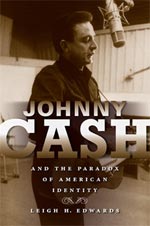 Leigh Edwards's book Johnny Cash and the Paradox of American Identity (Indiana University Press, 2009) has garnered both high praise from popular culture scholars and a second printing of the book. The "good buzz" for Edwards includes interviews for various National Public Radio stations and XM satellite radio as well as consultation on a proposed PBS documentary on one of the most influential musicians of the twentieth century.
Leigh Edwards's book Johnny Cash and the Paradox of American Identity (Indiana University Press, 2009) has garnered both high praise from popular culture scholars and a second printing of the book. The "good buzz" for Edwards includes interviews for various National Public Radio stations and XM satellite radio as well as consultation on a proposed PBS documentary on one of the most influential musicians of the twentieth century.
In writing about the "Man in Black," Edwards applied her interest in the relationship between literature and mass culture, and says she believes strongly in the importance of studying popular culture and the media. "In this digital era of what media scholar Henry Jenkins calls 'transmedia' storytelling, literary analysis provides us with important tools for analyzing narratives across a number of media formats," she says. "For this book, I analyzed how the work and media image of a popular music icon illuminate key issues in American culture, from ideas of 'authenticity' in popular music to formulations of Southern white working class masculinity through folk culture.
 "What makes Cash a productive case study is that he encapsulates many of the core contradictions in American culture in a form of popular music that scholars have likened to 'folk poetry.'" Edwards says that throughout his long career, "Cash was depicted—and depicted himself—as a walking contradiction: social protestor and establishment patriot, drugged wildman and devout Christian crusader, rebellious outlaw and elder statesman, sinner and saint. I argue that Cash embodies irresolvable contradictions that reflect foundational issues in the American experience, such as the tensions between freedom and patriotism, individual rights and nationalism, and the sacred and the profane," she says.
"What makes Cash a productive case study is that he encapsulates many of the core contradictions in American culture in a form of popular music that scholars have likened to 'folk poetry.'" Edwards says that throughout his long career, "Cash was depicted—and depicted himself—as a walking contradiction: social protestor and establishment patriot, drugged wildman and devout Christian crusader, rebellious outlaw and elder statesman, sinner and saint. I argue that Cash embodies irresolvable contradictions that reflect foundational issues in the American experience, such as the tensions between freedom and patriotism, individual rights and nationalism, and the sacred and the profane," she says.
For her research, Edwards used resources such as Cash's lyrics, music, liner notes, and interviews; letters Cash wrote to his first wife, Vivian Cash; documentaries and music journalism about him; and the 2005 movie, Walk the Line. "The conversation between literary studies and media studies is a productive one, and I use methodologies drawn from both disciplines," Edwards says. She also drew on fan club materials at the Country Music Foundation in Nashville: "Assessment of audience reception and consumption is particularly important in media studies," Edwards says.
In his review of Johnny Cash and the Paradox of American Identity, Bob Batchelor, editor of Literary Cash, lauds Edwards for her "tour de force of scholarship, analysis, and insight," and says her "definitive" book "will stand as the go-to source for understanding Cash's transformation from popular singer to popular culture icon well into the foreseeable future." Toby Miller, author of Makeover Nation: The United States of Reinvention, calls it "wonderfully written, a bravura tour around the cosmic ambivalence and contradiction of proletarian white masculinity," and David Sanjek, author of American Popular Music Business in the 20th Century, writes that the book "authoritatively illustrates the many hues that made up the far from monochromatic personality of the Man in Black."
Edwards continues this line of research with new work she is doing on gender and performance in popular music. Her next subject is another music legend, Dolly Parton. "In analyzing Dolly Parton's work and media image as a case study," she says, "I'm discussing constructions of femininity, camp, and authenticity narratives in popular culture."
